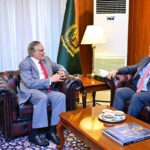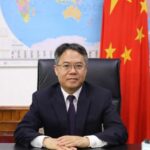UNITED NATIONS, Aug 07 (APP): Pakistan’s UN Ambassador, Munir Akram, has underscored the need for the world community to end India’s human rights violations in illegally occupied Kashmir and move to resolve the Kashmir dispute in accordance with the UN resolutions and Kashmiri people’s wishes when he briefed OIC members on the situation in the disputed state.
“We, first and foremost, rely on our muslim brothers and sisters from OIC to uphold the right of self-determination of Kashmiri people,” he told representatives of Islamic nations in a virtual meeting on Thursday.
The Pakistani envoy has been keeping a busy schedule of engagements with key diplomats and senior UN officials, updating them on the plight of Kashmiris suffering under India’s repressive lockdown that accompanied its illegal action to end the special status of Kashmir.
Ambassador Akram told OIC members that on August 5, 2019, India removed the legal fig leaf from occupied Jammu and Kashmir when it abrogated Article 370 of its Constitution, which accorded ostensible ” autonomy” to the state, and bifurcated it into two “Union Territories” of Jammu and Kashmir and Ladakh.
These measures not only violated India’s own constitution but were in violation of UN Security Council resolutions which bar any “party” from taking unilateral action, he said. Under these resolutions, the final disposition of the dispute had to determined by the people of Jammu and Kashmir through a UN-supervised plebiscite.
Anticipating Kashmiri opposition, the Pakistani envoy said India increased its troop strength in Kashmir to 900,000 – one soldier for every eight Kashmiris. It imposed a military siege, a 24 hour curfew, and a complete communications blackout. All political leaders and prominent Kashmiris were incarcerated. An estimated 13,000 young men and boys were abducted and jailed all across India. Many have been tortured. All these measures remain in place.
The Government unabashedly proclaimed it the “final solution” for Kashmir — the military occupation and annexation followed by demographic transformation from a Muslim majority State to a Hindu majority territory.
By removing Article 35 of its Constitution and changing the domicile “regulations” in Illegally occupied Kashmir, Ambassador Akram said India has opened the door to such demographic transformation. More than 400,000 thousand Indian military and civilian officials and their families have already obtained residency rights in Kashmir. This “demographic flooding” of an occupied territory violates Security Council resolutions, the Fourth Geneva Convention and the Genocide Convention.
In a joint statement issued earlier this week, he pointed out that multiple Special Rapporteurs of the Human Rights Council expressed alarm at the deteriorating situation of human rights in Jammu and Kashmir. Similarly, the OIC Secretariat and OIC-Independent Permanent Human Rights Commission (IPHRC) also issued statements a day earlier.
To add insult to injury, he said on the anniversary of India’s illegal measures in Kashmir, Prime Minister Narendra Modi laid the foundation stone for the construction of a Hindu temple on the Ayodhya site of the historic Babri Mosque which was illegally destroyed by the same BJP-RSS fanatics who have been given the right to construct the temple.
Kashmir and Ayodya are part of the BJP-RSS design to eliminate the legacy of Islam and transform India into a Hindu “Rashtra” (State), Ambassador Akram told the meeting.
To justify its crimes in Kashmir, he said, the rulers in New Delhi have borrowed from the colonial playbook by portraying the Kashmiri resistance as “terrorism”.
The legitimacy of the indigenous Kashmiri struggle for self-determination is recognized by international law and relevant UN resolutions. In response to Indian allegations of “infiltration”, Pakistan has offered to have the UN Observers stationed in Jammu and Kashmir verify all such allegations, but India has not responded.
There was good reason for concern as under domestic pressure resulting from its failed strategy in Kashmir and mismanagement of the economy and the COVID-19 response, the Indian Government may seek to divert attention by resorting to another military adventure against Pakistan, perhaps after staging a “false flag” terrorist incident, Ambassador Akram said.
Pakistan does not want war with India, but he warned that “we will respond with all our capabilities to any Indian aggression. “A war between nuclear armed states should not even be contemplated.”
“We are happy that the Security Council met for the third time (in a year) on Wednesday on the first anniversary of India’s unilateral actions in Kashmir, he said, while pointing out that the meeting took place while Modi was launching Hindu Temple on the site of Babri Mosque.
A number of representatives of OIC member states took the floor to voice their concern over the situation in Kashmir.
Saudi Arabia’s Khaled Mohammed Almanzlawiy reiterated Riyadh’s support for resolution of Jammu and Kashmir dispute in line with United Nations Security Council and OIC resolutions. Emphasizing the importance of dialogue, he called for the immediate halt to all human rights violations in Jammu and Kashmir.
Egypt’s Tarek Fathi stated that his government’s position on the issue continued to be guided OIC resolutions on this issue, including the recent ones adopted during the Makkah Summit last year. Recalling the important role of the OIC Special Envoy on Jammu and Kashmir, as well as the work of the relevant OIC Contact Group, he called for pacific settlement of the dispute.
Turkey’s Rauf Alp Denktas expressed deep concerns on the Indian unilateral and illegal actions. While referring to the official press release issued by Turkish Ministry of Foreign Affairs, he called on India to reverse its unilateral actions, end communications blackout and stop human rights violation in Jammu and Kashmir.
Denktas also appreciated the Security Council for holding three closed consultations on the issue after a gap of many years. It underscored that all OIC states, as muslim countries, must lend their voice in support of the oppressed people of Jammu and Kashmir.
Azerbaijan’s Yashar Aliyev highlighted that as a member of the OIC Contact Group on Jammu and Kashmir, its position on the issue remain unchanged which was the resolution of the dispute in accordance with self-determination of the Kashmiri people. While highlighting the importance of dialogue, he urged the international community to play a more active role in finding a durable solution.
Iran’s Raz Saharaei underscored Tehran’s strong support for a peaceful and negotiated solution of Jammu and Kashmir in line with the wishes of the people of Jammu and Kashmir. While noting that there was no military solution, it urged all parties to show restraint and find a negotiated and political solution to the dispute.
Indonesia’s Mohammad Kurniadi Koba stated that in his country’s capacity as President of the Security Council he followed the closed discussions of the Council on the issue very closely.
The Council members expressed their concerns on the deteriorating situation which remained quite tense. He called on all parties to show restraint and avoid from taking any actions that could further aggravate the tensions.






